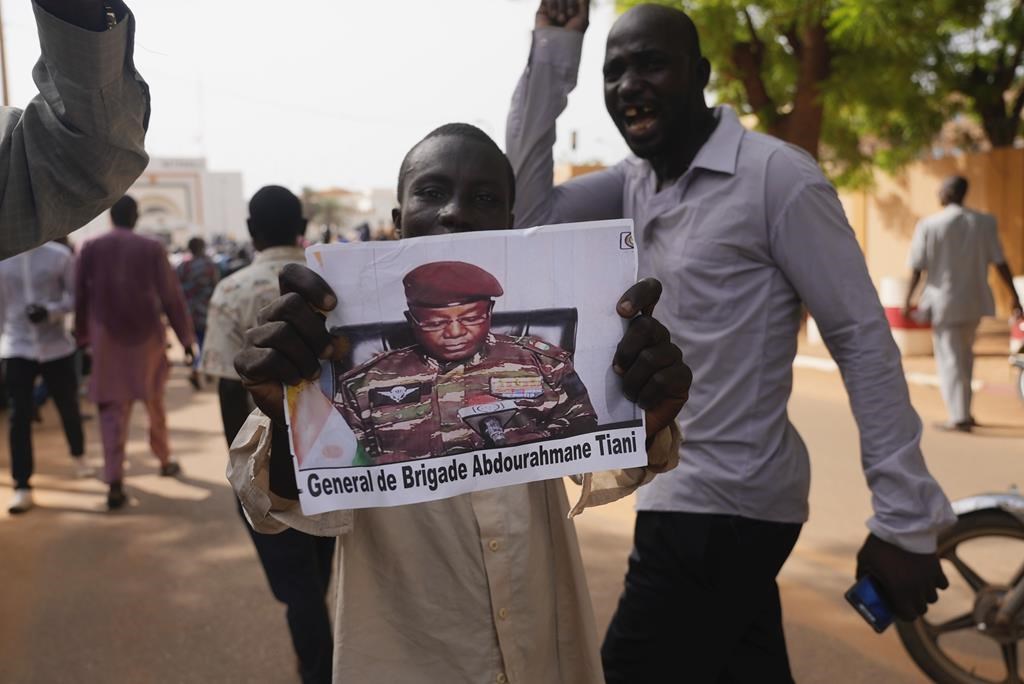Ottawa is joining calls for Niger’s president to be reinstated after he was ousted during an attempted coup in the West African country last week.

President Mohamed Bazoum has been detained since July 26 after Niger’s presidential guard, which is headed by General Abdourahmane Tchiani, overran the government. He was appointed head of state on July 28 by a governing council set up by military forces.
Niger’s coup could have serious consequences for democratic progress and the fight against an insurgency by jihadist militants in the region, where Niger is a key Western ally.
Here is what you need to know.

What happened in Niger?
On July 26, Niger’s presidential guard claimed to have overthrown Bazoum, the country’s democratically elected president, after detaining him in his palace. He has yet to resign.
Tchiani was sworn in two days later, and since then, the military-led regime has started to crack down on the government and civil liberties.
On Sunday evening, four government officials were arrested including Mahamane Sani Mahamadou, the minister of petroleum and son of former President Mahamadou Issoufou; Kassoum Moctar, minister of education; Ousseini Hadizatou Yacouba, the minister of mines, and Foumakoye Gado, the president of the ruling party.

That same night, military spokesperson Col. Maj. Amadou Abdramane said on state television that all government cars need to be returned by midday Monday and banned the use of social media to diffuse messages against state security.
Niger’s airspace and land borders have also been closed.
Tiani, the 62-year-old decorated general and former military attache at Niger’s embassy in Germany, has led the elite presidential guard unit since 2011.
In a statement on state television on Friday, Tiani asked “the technical and financial partners and friends of Niger to understand the specific situation of our country and provide all necessary support to help it overcome the challenges it faces.”

Reiterating that soldiers had seized power because of worsening security in the country, Tiani said, “We cannot continue with the same approaches proposed so far, as it risks witnessing the gradual and inevitable disappearance of our nation.”
Insecurity has remained a problem since Bazoum was elected in 2021 as jihadists who took root in neighbouring Mali in 2012 gained ground, killing thousands and displacing over six million across the region.
How are nations responding?
Since relations with Burkina Faso and Mali’s military-led governments soured, Niger’s role had become increasingly important for Western nations helping to fight the insurgency.
West African nations on Monday gave the coup leaders one week to reinstate Bazoum and threatened to use force if their demands aren’t met.
The announcement came at the end of an emergency meeting of the Economic Community of West African States (ECOWAS) Sunday.

“In the event the authority’s demands are not met within one week, (the bloc will) take all measures necessary to restore constitutional order in the Republic of Niger. Such measures may include the use of force,” it said in a statement.
The bloc also imposed strict sanctions, including suspending all commercial and financial transactions between ECOWAS member states and Niger, and freezing assets in regional central banks.
The impacts could be severe, with Niger being the third-poorest country in the world, according to United Nations data. The country relies on imports from Nigeria for up to 90 per cent of its power, according to the International Renewable Energy Agency.

The 15-nation ECOWAS bloc has unsuccessfully tried to restore democracies in nations where the military took power in recent years. Four nations are run by military governments in West and Central Africa, where there have been nine successful or attempted coups since 2020.
Britain and the European Union have pulled aid from the country, while Washington has mulled following suit. France prepared to evacuate French and European nationals from Niger on Tuesday.
Meanwhile, Canada is throwing its support behind ECOWAS.
“Canada reiterates that President Mohamed Bazoum, his family and the detained members of the democratically elected government must be released immediately. We also support ECOWAS’s call for the reinstatement of President Bazoum as head of state within the timeframe prescribed by the regional organization,” Global Affairs Canada said in a statement Tuesday.
“Canada condemns the coup attempt, which threatens the stability of Niger and the region. The forcible seizure of power by elements of the defence and security forces compromises the peace, stabilization and development efforts undertaken by the democratically elected government. Canada is committed to supporting democracy, inclusive governance and the rule of law.”
What do Canadians need to know?
Global Affairs Canada (GAC) is urging Canadians in need of emergency consular assistance to contact the Embassy of Canada in Bamako, Mali.
Canada’s honorary consul of Niger “could be limited or unavailable without notice due to the ongoing security situation,” GAC said on its website.
In its latest travel advisory, the government is warning against all travel to the nation and is advising Canadians in Niger to register with GAC, among other measures.
There are currently 269 Canadians registered as being in Niger as of Tuesday, a GAC spokesperson told Global News.
For Canadians in Niger, GAC advises them to exercise caution and be aware of their surroundings, avoid areas near government buildings, groups of security forces and where large gatherings are taking place, shelter in place if they can’t leave the area safely, keep doors and windows locked at all times and ensure personal belongings, such as a passport and other documents are secure at all times.
Furthermore, GAC advises Canadians to remove any loose objects from outside their home that can be thrown at doors and windows, and follow the instructions of local authorities.

Finally, sanctions on Niger may lead to shortages of necessities, therefore Canadians are advised to keep a supply of water, food, medicine and cash on hand, keep their phone charged and monitor local and international media to stay informed on the evolving situation.
— with files from The Associated Press and Reuters





Comments